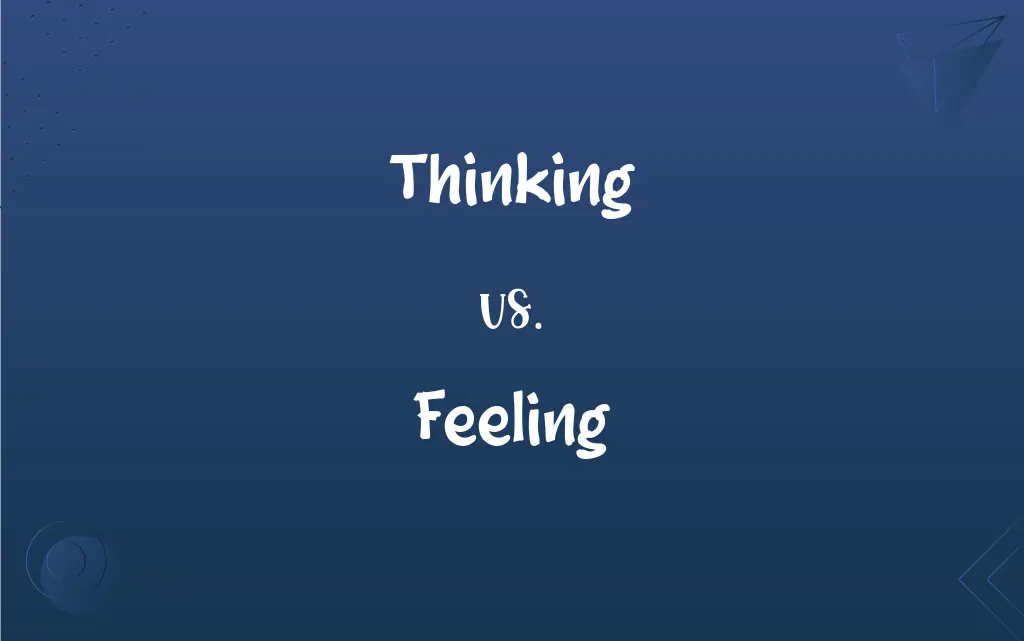Thinking vs. Feeling: What's the Difference?
Edited by Harlon Moss || By Janet White || Published on December 2, 2023
Thinking is the process of considering or reasoning about something, whereas feeling is the experience of emotional or physical sensations.

Key Differences
Thinking involves cognitive processes like analyzing, evaluating, and problem-solving. It's about using logic and reason. Feeling, in contrast, is about experiencing emotions and sensations, which might include happiness, sadness, or physical touch.
In decision-making, thinking focuses on facts, data, and objective criteria. It relies on logical reasoning. Feelings, however, guide decisions based on personal values, emotional responses, and subjective perceptions.
Thinking is often associated with the mind and intellectual activities. It's about forming thoughts and ideas. Feeling relates more to the heart and personal experiences, encompassing emotions and empathetic understanding.
The process of thinking can be conscious and deliberate, requiring focus and mental effort. Feelings can be more spontaneous and intuitive, often arising naturally without conscious thought.
Thinking often seeks to understand and explain, aiming for clarity and solutions. Feeling, on the other hand, is more about expressing and experiencing, often without the need for resolution or explanation.
ADVERTISEMENT
Comparison Chart
Nature
Cognitive, analytical
Emotional, sensory
Role in Decision-Making
Based on logic and objective facts
Guided by emotions and personal values
Association
With the mind and intellect
With the heart and personal experience
Process
Conscious and deliberate
Spontaneous and intuitive
Purpose
To understand, explain, and solve
To express and experience
ADVERTISEMENT
Thinking and Feeling Definitions
Thinking
The action of using one's mind to produce thoughts.
Critical thinking is essential in scientific research.
Feeling
Being sensitive to or aware of something.
She had a deep feeling of empathy for the suffering.
Thinking
Analyzing facts and data to form a conclusion.
His thinking was influenced by the latest data.
Feeling
A physical sensation that one experiences.
The feeling of the soft fabric delighted him.
Thinking
Using logic and intellect to form ideas or judgments.
His thinking led him to a revolutionary new theory.
Feeling
An intuitive understanding or impression.
He had a strong feeling that something was amiss.
Thinking
Deliberate contemplation or pondering.
She spent hours thinking about the best solution.
Feeling
Experiencing emotional states or reactions.
She was feeling joyful after hearing the good news.
Thinking
The act or practice of one that thinks; thought.
Feeling
Expressing an emotional state.
He was feeling frustrated with the delays.
Thinking
A way of reasoning; judgment
To my thinking, this is not a good idea.
Thinking
Characterized by thought or thoughtfulness; rational
We are thinking animals.
Thinking
Thought; gerund of think.
What is your thinking on this subject?
Thinking
Present participle of think
I'm thinking about inventing a new perpetual-motion machine.
Thinking
Having the faculty of thought; cogitative; capable of a regular train of ideas; as, man is a thinking being.
Thinking
The act of thinking; mode of thinking; imagination; cogitation; judgment.
I heard a bird so sing,Whose music, to my thinking, pleased the king.
Thinking
The process of thinking (especially thinking carefully);
Thinking always made him frown
She paused for thought
Thinking
Endowed with the capacity to reason
Thinking
The process of considering or reasoning about something.
Her thinking was clear and logical in solving the complex problem.
FAQs
How do feelings affect decision-making?
Feelings can guide decisions based on personal values and emotional reactions.
Is thinking always rational?
Thinking is generally rational, but it can be influenced by biases and emotions.
Can feelings be controlled?
While feelings themselves are natural, one can often control how they respond to those feelings.
Are thinking and feeling mutually exclusive?
No, they often interact and influence each other in decision-making and perception.
Is logical thinking always the best approach?
Not always, as some situations benefit from emotional intelligence and empathy.
Does thinking require conscious effort?
Thinking often requires conscious effort, though some thought processes can be subconscious.
Can thinking be influenced by emotions?
Yes, emotions can significantly influence thinking, sometimes leading to biased judgments.
Can physical sensations be considered feelings?
Yes, physical sensations like pain or comfort are types of feelings.
How is critical thinking different from general thinking?
Critical thinking involves analyzing and evaluating information in a more structured and skeptical way.
Can feelings be misleading?
Yes, feelings can sometimes be based on misperceptions or incomplete information.
Is feeling a form of intuition?
Feelings can be intuitive, providing an instinctive understanding of situations or people.
Can feelings change over time?
Yes, feelings can change based on new experiences, insights, or changes in perspective.
Are feelings always related to emotions?
Mostly, feelings are related to emotions, but they can also refer to physical sensations.
Is brainstorming a form of thinking?
Yes, brainstorming is a creative thinking process for generating ideas.
Is analytical thinking different from logical thinking?
Analytical thinking involves breaking down complex information, while logical thinking is about reasoning and drawing conclusions.
Are feelings always conscious?
Feelings can be both conscious and subconscious, depending on the context.
Can thinking improve with practice?
Yes, thinking skills like critical and analytical thinking can improve with practice.
Are feelings always evident to others?
Not necessarily; some people can hide or mask their feelings.
How do feelings contribute to empathy?
Feelings allow individuals to understand and share the emotions of others, which is the essence of empathy.
What role does thinking play in problem-solving?
Thinking is crucial in problem-solving, as it involves analyzing the problem and devising solutions.
About Author
Written by
Janet WhiteJanet White has been an esteemed writer and blogger for Difference Wiki. Holding a Master's degree in Science and Medical Journalism from the prestigious Boston University, she has consistently demonstrated her expertise and passion for her field. When she's not immersed in her work, Janet relishes her time exercising, delving into a good book, and cherishing moments with friends and family.
Edited by
Harlon MossHarlon is a seasoned quality moderator and accomplished content writer for Difference Wiki. An alumnus of the prestigious University of California, he earned his degree in Computer Science. Leveraging his academic background, Harlon brings a meticulous and informed perspective to his work, ensuring content accuracy and excellence.






































































